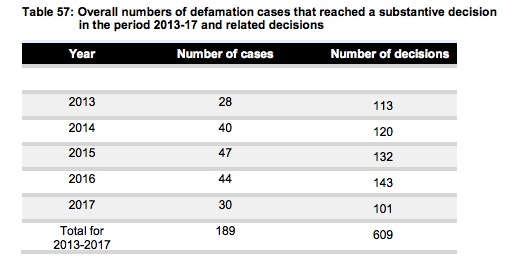Defamation landscape changing as questions continue around what constitutes a ‘publisher’
While high-profile defamation cases such as Rebel Wilson and Geoffrey Rush dominate media coverage, ordinary Australians are increasingly turning to the courts to fight battles over their online reputations, a university survey has found.
The study by the Centre for Media Transition at the University of Technology Sydney (UTS), partly funded by News Corporation, found a majority of Australian defamation cases now involved online media and only 21% of actions between 2013 to 2017 involved public figures.

Of the 189 cases identified by the researchers over the five-year period, 16 cases involved Facebook posts, 20 were over e-mails, four involved tweets and two concerned text messages. The survey also identified 609 court decisions relating to the 198 cases.


Looking at the figures, I do not see much if any increase over the last 5 years.